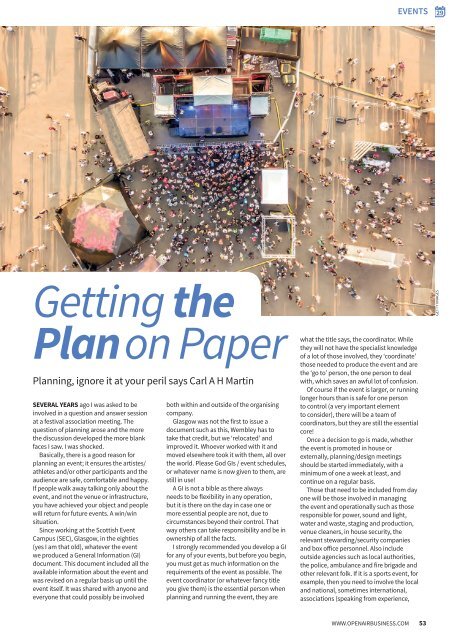February 2020
The UK's outdoor hospitality business magazine for function venues, glamping, festivals and outdoor events
The UK's outdoor hospitality business magazine for function venues, glamping, festivals and outdoor events
- No tags were found...
Create successful ePaper yourself
Turn your PDF publications into a flip-book with our unique Google optimized e-Paper software.
EVENTS<br />
Getting the<br />
Plan on Paper<br />
Planning, ignore it at your peril says Carl A H Martin<br />
SEVERAL YEARS ago I was asked to be<br />
involved in a question and answer session<br />
at a festival association meeting. The<br />
question of planning arose and the more<br />
the discussion developed the more blank<br />
faces I saw. I was shocked.<br />
Basically, there is a good reason for<br />
planning an event; it ensures the artistes/<br />
athletes and/or other participants and the<br />
audience are safe, comfortable and happy.<br />
If people walk away talking only about the<br />
event, and not the venue or infrastructure,<br />
you have achieved your object and people<br />
will return for future events. A win/win<br />
situation.<br />
Since working at the Scottish Event<br />
Campus (SEC), Glasgow, in the eighties<br />
(yes I am that old), whatever the event<br />
we produced a General Information (GI)<br />
document. This document included all the<br />
available information about the event and<br />
was revised on a regular basis up until the<br />
event itself. It was shared with anyone and<br />
everyone that could possibly be involved<br />
both within and outside of the organising<br />
company.<br />
Glasgow was not the first to issue a<br />
document such as this, Wembley has to<br />
take that credit, but we ‘relocated’ and<br />
improved it. Whoever worked with it and<br />
moved elsewhere took it with them, all over<br />
the world. Please God GIs / event schedules,<br />
or whatever name is now given to them, are<br />
still in use!<br />
A GI is not a bible as there always<br />
needs to be flexibility in any operation,<br />
but it is there on the day in case one or<br />
more essential people are not, due to<br />
circumstances beyond their control. That<br />
way others can take responsibility and be in<br />
ownership of all the facts.<br />
I strongly recommended you develop a GI<br />
for any of your events, but before you begin,<br />
you must get as much information on the<br />
requirements of the event as possible. The<br />
event coordinator (or whatever fancy title<br />
you give them) is the essential person when<br />
planning and running the event, they are<br />
what the title says, the coordinator. While<br />
they will not have the specialist knowledge<br />
of a lot of those involved, they ‘coordinate’<br />
those needed to produce the event and are<br />
the ‘go to’ person, the one person to deal<br />
with, which saves an awful lot of confusion.<br />
Of course if the event is larger, or running<br />
longer hours than is safe for one person<br />
to control (a very important element<br />
to consider), there will be a team of<br />
coordinators, but they are still the essential<br />
core!<br />
Once a decision to go is made, whether<br />
the event is promoted in house or<br />
externally, planning/design meetings<br />
should be started immediately, with a<br />
minimum of one a week at least, and<br />
continue on a regular basis.<br />
Those that need to be included from day<br />
one will be those involved in managing<br />
the event and operationally such as those<br />
responsible for power, sound and light,<br />
water and waste, staging and production,<br />
venue cleaners, in house security, the<br />
relevant stewarding/security companies<br />
and box office personnel. Also include<br />
outside agencies such as local authorities,<br />
the police, ambulance and fire brigade and<br />
other relevant folk. If it is a sports event, for<br />
example, then you need to involve the local<br />
and national, sometimes international,<br />
associations (speaking from experience,<br />
GETTY IMAGES<br />
WWW.OPENAIRBUSINESS.COM 53


















